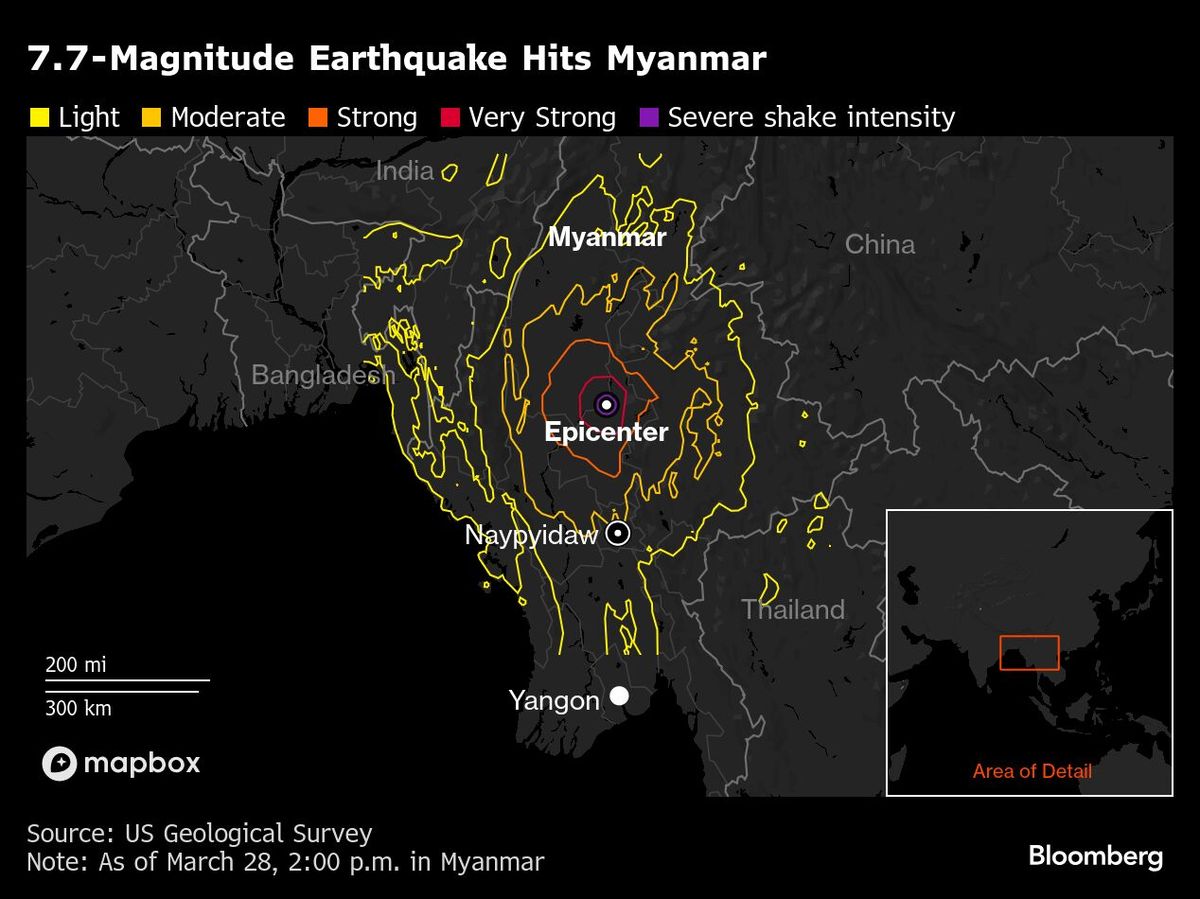
(April 2): Myanmar’s military said it fired “warning shots” at a vehicle convoy from the Red Cross Society of China bringing aid to the central areas of the country devastated by Friday’s earthquake, which has killed more than 2,800 people.
The convoy of nine vehicles bound for Mandalay was approached by military security forces in a northern town where clashes were ongoing with an opposing ethnic armed group, a junta official said on Wednesday. The troops then attempted to halt the vehicles, after the relief group apparently failed to notify authorities of its movements.
“We attempted to stop the convoy, but they refused to stop,” said the ruling State Administration Council’s spokesman, Major General Zaw Min Tun. “After that, we fired warning shots from about 100 metres away, and we understand they fled back.” There were no casualties or damage, he said.
An earlier account from the Ta’ang National Liberation Army said the junta opened fire on the convoy, although the rebel group didn’t say whether there was any damage.
Chinese Foreign Ministry spokesman Guo Jiakun told reporters at regular news briefing in Beijing on Wednesday that the rescue team and supplies are safe, but did not confirm the incident. The death toll from the quake was at 2,886 as of Wednesday morning, according to Myanmar’s military regime.
There was no immediate comment from the Red Cross Society of China.
China is Myanmar’s biggest trading partner and has played a key role in mediating ceasefire talks for a regime scorned by Western democracies.
Junta chief Min Aung Hlaing, who runs a military known as Tatmadaw, earlier rejected ceasefire proposals from rebel groups seeking to facilitate aid to areas impacted by the earthquake as concerns mount over how the conflict could hinder relief efforts.
“Some ethnic armed organisations are not currently engaged in combat but are organising and training for future attacks,” Min Aung Hlaing said during a fund-raising event on Tuesday in Naypyidaw, the country’s capital. “As their actions are still considered attacks, the Tatmadaw will continue to take necessary security measures,” he said.
The remarks are another sign there may be little reprieve in a conflict that reignited four years ago after the military seized control of much of the nation in a coup. Even as the damage of the 7.7 magnitude quake was still being assessed, pro-democracy rebel groups reported fresh military airstrikes on Friday in areas close to the epicentre.
Proposed ceasefire
A pro-democracy shadow government allied to detained civilian leader Aung San Suu Kyi declared a two-week ceasefire following the quake. With the death toll likely to grow, another alliance of rebel groups that had made substantial territorial gains against the military also announced it would not initiate offensive operations for a month.
Lway Yay Oo, spokeswoman of the northern-based Ta’ang National Liberation Army, said three such bombings have occurred since the earthquake, leading to injuries and residential buildings being destroyed. “They are committing inhumane acts, like always,” she said.
Min Aung Hlaing said his military hasn’t conducted operations on enemy camps, but has responded when it was attacked.
The bombing run on Friday nevertheless drew condemnation from the United Nations and rights groups, with Amnesty International saying it’s added “to the strain of recovery efforts and the fear and anxiety of survivors.” For now, the military is tightly managing access to the areas it controls that sustained heavy damage including Naypyidaw and Mandalay, a city of over a million people.
“This is an indication of how weak his regime and military are at this juncture,” said Richard Horsey, a senior adviser at Crisis Group.
“They are mostly in defensive mode, trying to prevent their positions being overrun, and even where they are on the offensive, the aim is most often limited to establishing more readily defendable positions.”
Uploaded by Felyx Teoh
- Berkshire dismisses 'false' reports on Buffett comments after Trump shares video
- Trump’s TikTok plan upended by Chinese objections over tariffs — Bloomberg
- LTAT moving forward despite challenges
- US starts collecting Trump's new 10% tariff, smashing global trade norms
- China’s rare earths curbs put multiple US industries at risk
- Melaka to host Visit Malaysia 2026 launching ceremony, says Anwar
- From Ray-Bans to wigs, US buyers may see unexpected price hikes
- Second batch of Putra Heights fire victims get temporary vehicles
- My Say: Taking inspiration from bacterium: the devolution of power
- China says 'market has spoken' after US tariffs spark selloff

